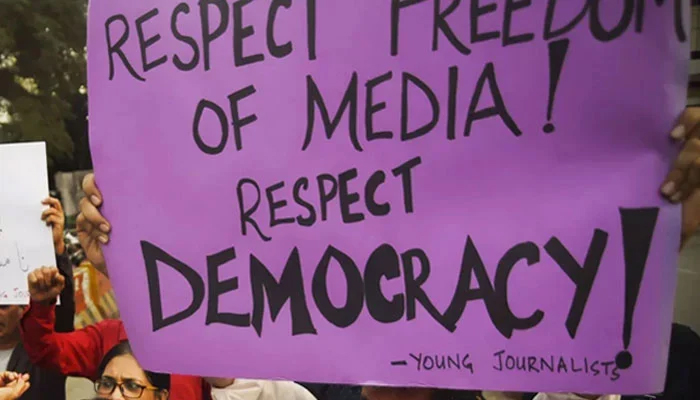Nothing to report on
Journalism is often called the fourth pillar of democracy. But over the years, especially with the rise of autocratic governments, efforts have been made to make this important pillar toothless. Censorship, threats, and attempts made to block advertising revenue for media outlets have badly hit press freedom in Pakistan.
Now, a ban has apparently been imposed on media coverage of certain court cases, particularly the cipher case which involves former prime minister Imran Khan and PTI leader Shah Mehmood Qureshi.
Three media organizations – the Pakistan Federal Union of Journalists (PFUJ), the Council of Pakistan Newspaper Editors (CPNE), and the Association of Electronic Media Editors and News Directors (AEMEND) – have strongly objected against the new form of censorship and said that “the restraint was surprising”. It merits a mention that a couple of months ago, Chief Justice Qazi Faez Isa headed the first-ever live streaming of a Supreme Court hearing. That exercise was appreciated by both law professionals and ordinary people who shared that such initiatives would make more people interested in the country’s political process. In a country where, according to a 2014 survey by Gallup, only 47.7 per cent people follow current events “somewhat”, such a blanket ban will lead to a nation unaware of the complexities faced by the country. From party supporters to critics, people have the right to know the merits of any such case and what transpires during the proceedings.
Those responsible for such bans should realize that lack of information will do no good. Instead, it allows conspiracy theorists and other propagandists to exaggerate the situation, spreading more paranoia among the people. And while a censorship exercise is never good, it should be vehemently opposed at a time when we are less than two months from an important election. The ever-changing red lines in mainstream media have already made it difficult for journalists to report on what’s happening in the country. The situation becomes even more difficult when those who are supposed to provide some relief to the country also choose suppression over liberty.
We saw one example of knee-jerk suppression of information last week, when some sites on the internet were shut down in what seemed to be an attempt to discourage internet users from participating in a ‘virtual’ jalsa. And now banning the coverage of a case that involves a popular leader will also prove to be futile. Pakistan has already witnessed awful consequences of short-term strategies employed to remove one person from power. We cannot see a repeat of the 2016-2018 period when the dismantling of the political process was in full swing. There is no room for repeating the same mistakes, and the time now is to fix the fractured democracy in the country, not hurt it further.
-
 All You Need To Know Guide To Rosacea
All You Need To Know Guide To Rosacea -
 Princess Diana's Brother 'handed Over' Althorp House To Marion And Her Family
Princess Diana's Brother 'handed Over' Althorp House To Marion And Her Family -
 Trump Mobile T1 Phone Resurfaces With New Specs, Higher Price
Trump Mobile T1 Phone Resurfaces With New Specs, Higher Price -
 Factory Explosion In North China Leaves Eight Dead
Factory Explosion In North China Leaves Eight Dead -
 Blac Chyna Opens Up About Her Kids: ‘Disturb Their Inner Child'
Blac Chyna Opens Up About Her Kids: ‘Disturb Their Inner Child' -
 Winter Olympics 2026: Milan Protestors Rally Against The Games As Environmentally, Economically ‘unsustainable’
Winter Olympics 2026: Milan Protestors Rally Against The Games As Environmentally, Economically ‘unsustainable’ -
 How Long Is The Super Bowl? Average Game Time And Halftime Show Explained
How Long Is The Super Bowl? Average Game Time And Halftime Show Explained -
 Natasha Bure Makes Stunning Confession About Her Marriage To Bradley Steven Perry
Natasha Bure Makes Stunning Confession About Her Marriage To Bradley Steven Perry -
 ChatGPT Caricature Prompts Are Going Viral. Here’s List You Must Try
ChatGPT Caricature Prompts Are Going Viral. Here’s List You Must Try -
 James Pearce Jr. Arrested In Florida After Alleged Domestic Dispute, Falcons Respond
James Pearce Jr. Arrested In Florida After Alleged Domestic Dispute, Falcons Respond -
 Cavaliers Vs Kings: James Harden Shines Late In Cleveland Debut Win
Cavaliers Vs Kings: James Harden Shines Late In Cleveland Debut Win -
 2026 Winter Olympics Snowboarding: Su Yiming Wins Bronze And Completes Medal Set
2026 Winter Olympics Snowboarding: Su Yiming Wins Bronze And Completes Medal Set -
 Trump Hosts Honduran President Nasry Asfura At Mar-a-Lago To Discuss Trade, Security
Trump Hosts Honduran President Nasry Asfura At Mar-a-Lago To Discuss Trade, Security -
 Cuba-Canada Travel Advisory Raises Concerns As Visitor Numbers Decline
Cuba-Canada Travel Advisory Raises Concerns As Visitor Numbers Decline -
 Anthropic Buys 'Super Bowl' Ads To Slam OpenAI’s ChatGPT Ad Strategy
Anthropic Buys 'Super Bowl' Ads To Slam OpenAI’s ChatGPT Ad Strategy -
 Prevent Cancer With These Simple Lifestyle Changes
Prevent Cancer With These Simple Lifestyle Changes




